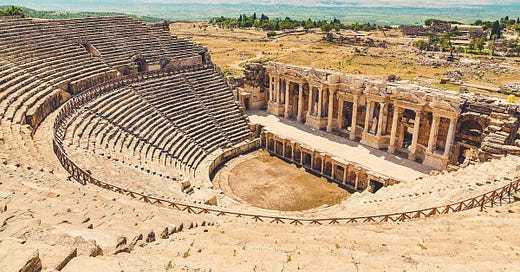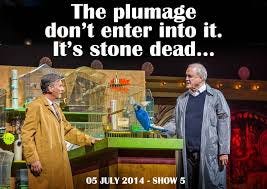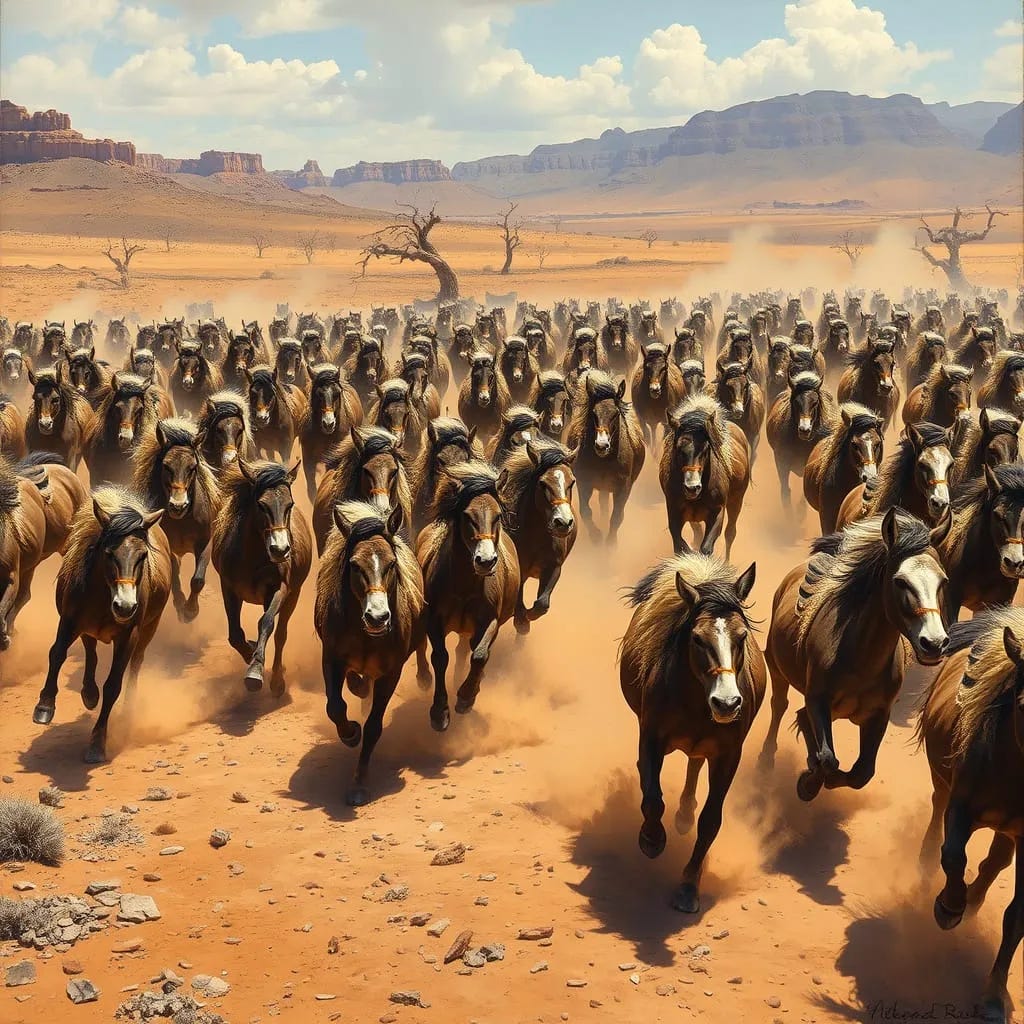And now, for something completely different.
Joachim Krueger has written here previously and was one of the consulting editors at Perspectives on Psychological Science who resigned in response to The Saga of Fiedler on the Roof and the Nonexistent Racist Mule.
The early work
by
Hoca Camide
Last known affiliation: The Madrassah of Mektoub
Curated and edited by Joachim I. Krueger, who prefers to remain anonymous under his cognomen Abdul Rahim.
Preamble
The identity of Hoca Camide remains a matter of much speculation. Some say Hoca is not even fluent in Turkish, being an Alevite Kurd and all. But as Hoca himself would say “It’s all Greek to me.” Hoca refuses – and the gentle reader should take this to heart – to be taken seriously, unless, of course, he really means it. A few years ago, I, Abdul Rahim, started to jot down Hoca’s excess narratives and sidebars, and Hoca agreed to have some of the early snippets published on this substack. “I would have,” Hoca said, “preferred a regular stack, but a sub- will do.”
Over a raki rocks Hoca shared his view that focused meditation Buddhist-style was not where it’s at. “I mean,” Hoca said, “when you sit and contemplate a lotus blossom, how can you crack yourself up?” “Then again,” I objected, “neither can you be made to feel uncomfortable.” And that’s the yin and yang right there. Hoca provokes, amuses, and bores those who care to listen. And then it is all gone. “Id est quod id est.,” Hoca latinized. So, let’s get on with it. The numbers to the left of the sayings indicate their chronology. Higher numbers refer to more recent sayings. Truth be told, Hoca remained skeptical about the wisdom of publishing some of his sayings. “My sayings,” he said, “oscillate between the heterodox and the inscrutable. What I tell you is my dream of consciousness.”
The sayings
17 Hoca Camide first became famous with a double-blind thought experiment. I asked him how he felt about the charge that he had no control group. Hoca said "I didn't see it coming."
22 I asked Hoca Camide why I should save the lecture on the death instinct for the end of the semester. "You want to go out with a bang," he said.
26 I once asked Hoca Camide about the meaning of Exodus. He said “Forget Egypt and the burning bush. Exodus is the story of life's journey. You start from the sweet bondage of your mother's womb, endure all sorts of troubles, piss off your friends and superiors, and then, when you are close enough to smell the milk & honey, you become one with nothingness.” I was like, “Hoca, I am sorry I asked!”
28 Hoca Camide once resigned from a post as a statistics lecturer. Said he: "They were all so dead-serious about survival analysis."
34 Hoca Camide once told me that he never understood why philosophers got so much enjoyment out of trashing hedonism.
41 Hoca Camide broke with Einstein over the question of whether the cosmological number should be a constant or a variable. It didn't go well with Newton either. Sir Isaac felt that Hoca's theory of gravitas was bull.
48 When I asked Hoca Camide why he was not more widely known, he said “Oblivion is my lived experience.”
54 Hoca Camide left academia when his work was rejected by the Journal of Irreproducible Results.
59 Hoca Camide once told me that the problem with psychologists is the belief that what they find out about their research subjects does not apply to themselves.
68 When Schrödinger told Hoca Camide that he had found his mistress dead in her Dublin apartment, Hoca advised him to go back to the pub, have a drink, and then go and look again.
71 Hoca Camide was once fired from his job as a tantra instructor. He couldn’t get out of bed.
81 Hoca Camide once told me that he left his job as a dean at the University of B, when the administration created an office to study the growth of nonproductive jobs at B.
85 Hoca Camide taught that life is a beach. You write your name in the sand and wait for the wave.
91 Hoca Camide once taught a class by not showing up. He said that this way, the easily intimidated students were not.
95 Hoca Camide joined the ‘Heterodox Academy’ to be among like-minded others.
96 Hoca Camide once gave a college convocation speech full of points that no one could disagree with. Then he told students to think for themselves and cultivate freedom of conscience. No one noticed the irony.
99 Hoca Camide once told his class on the first day of the semester that he was shopping the course.
102 Hoca Camide taught that “Self-esteem is what’s left when nobody loves you.”
103 Back in Sinop, Hoca Camide found that he could not make a living teaching reconstructionist Sufiism. Though his lessons were halal, hand-crafted, and donation-based, Hoca felt that when pupils pay for receiving them, money has beaten mysticism. Hoca’s lessons are now free – if you can find them – and he supports himself with a day job in the docks of Antwerp.
107 Hoca Camide once gave a speech on the wisdom of silence. When I asked him how it went, he said the Q&A part was confusing. No one knew who should be silent first.
108 Hoca Camide trusted the faithful, although it offended the fickle, followed the wise, although it alienated the fools, and he loved the beautiful, although it angered the ugly. When I asked him if that was fair, he gave me a kick in the shin.
110 Hoca Camide broke off his psychoanalysis when his doc refused to give him the silent treatment.
111 When Hoca Camide was still teaching theoretical theology in Tarsus, he used to read the texts he had assigned to the students himself, only to then being left explaining these texts to the students. Much impressed with Schelling’s (1960) ‘Theory of Conflict,’ Hoca then stopped reading what he had assigned and measured the success of the class by the students’ ability to explain the texts to him.
116 I once asked Hoca Camide if he had ever, as a seasoned spiritual guide, considered working as a life coach. “Well,” Hoca said,” I did work as a death coach once, but I kept losing clients.”
117 I once asked Hoca Camide what it was like studying with the mystics in the mountains of Karabakh. “It was most enlightening,” Hoca said. They would actually say what they thought I should think they were thinking.”
“Did you learn anything new or profound from them,” I pressed on. “Sure,” Hoca said, “they gave me a whole new perspective on what you call The Book of Genesis.” “How so, Hoca?” I pressed on for details. “Well,” Hoca said, “the mystics of Karabakh think that Adam and Eve planned their eviction from the garden and conned god into kicking them out.”
“But why?” I continued, incredulously. “They were bored out of their minds,” Hoca explained. Every day the same vegan food, no one to gossip about, nowhere to shop, no babes or hunks to pursue. You kinda go nuts. But not being able to have a lamb chop for Easter was the worst, what with the lion lying next to the lamb and all. So Adam & Eve plotted to get outa Dodge.”
“Jesus,” I exclaimed, “does this mean that god got the worse part of the deal?” “You better believe it, son,” Hoca grinned. “Lacking 20/20 foresight, god did not realize he’d be stuck with daily and nightly monitoring of all humans in their ever-increasing numbers, their evil deeds, their pornographic thoughts, and their weakness for processed food. Had god known that he would end up drowning humanity, rain burning phosphorus on the survivors, torture Job physically and Abraham mentally, only to then reincarnate himself as his own son to the tortured and crucified, well, he might have said ‘Adam & Eve, listen here, I punish you by condemning you to eternal life in this here garden’.”
“Ok, Hoca,” I exhaled. I think you are pulling my leg. Or are you telling me that the mystery of mysticism is to take a good story and then turn it inside out?” After a pregnant pause, Hoca concluded “Don’t forget your dialectics. The monks of Karabakh have given us a great antithesis. We already know the thesis. Now look for the synthesis.” “Dialectics, my ass, Hoca!” I yelled. I didn’t speak to him for weeks after that. Upon reflection, I was glad to not be in the garden. I would not want to see Hoca naked.
122 I once asked Hoca Camide what he thought of the Dunning-Kruger effect. Hoca said, “I refuted the effect years ago, back when I was studying with Dojo in Ashram.” “Tell me, Hoca,” I said, “how did you refute it?” “Easy,” Hoca said, “I knew that I didn’t understand it.”
126 Hoca Camide never overestimated his impact. “I am a private intellectual,” he used to say.
128 I asked Hoca Camide what he thought of positive psychology. “I like it very much,” Hoca said, “for the same reason that I like critical theory, applied metaphysics, or behavioral theology. It doesn’t commit me to any concrete ideas.”
132 I once tried to tell Hoca Camide about our work on “deliberate ignorance.” “I don’t want to hear about it,” he gruffed.
138 I once asked Hoca Camide what he thought of psychology. “Every science has its ultimate question” he said. “For physics it’s ‘What is matter;’ for biology it’s ‘What is life.’ What do you think it is for psychology?” “What is consciousness?” I triumphantly declared. “No,” Hoca said, “Psychology must answer the question ‘What is wrong with people?’”
139 “You see,” Hoca Camide once told me, “the problem is not just that people are selfish, but that they desperately want others not to be.”
140 I told Hoca Camide that I was working on an app that students can install on their phones. After each class session, the phone will beep and won't stop beeping until the student has indicated their liking of the session. Unless it's a positive rating, the beeping will get louder. At the same time, several emails will be sent out to the student to inquire about the experience. These emails will be synced with FB, IG, & Twitter. A machine-learning algorithm, which has been trained on human and nonhuman data, and which tracks all codable deliverables, will then optimize my performative teaching for greater client satisfaction. “Text me,” Hoca said, “and let me know how it goes.”
143 “When I die,” Hoca Camide once said, “I will become one with the data.”
148 When Hoca Camide was en route east of Huangshan, he asked where he might find the Tao King. “Just follow the way, man,” came the answer. “Well then,” said Hoca, sat down under the Greeting Pine and ate his lunch.
153 Hoca Camide, who had studied Schopenhauer’s early works with the great Pan Shad-Kashmiri, taught that while humans find unhappiness in pain or boredom, non-human animals do not know of boredom in their natural state. “When they are not in pain,” Hoca explained, “animals are happy. They are bored only in captivity.” “What does this imply for us humans, Hoca?” I asked. “Our experience of boredom proves that we live in captivity,” Hoca deduced. “How can I verify this inference?” I inquired. “You can’t,” Hoca said, “but when you are ready, its truth will be revealed to you.”
170 I caught up with Hoca Camide in the souk of Meknes. “Are you selling or buying?” I asked him. “I have discovered demand-side economics,” Hoca said. “If I want a cactus-fiber rug, there must be one.” “Isn’t that wishful thinking?” I asked. “Quite right,” Hoca retorted. “It’s economics.”
177 I once asked Hoca Camide why he had never married. “Well,” he said, “the right girl came along.”
179 Hoca Camide took a sip from his Arabica dry brew and moaned “I feel sick.” “How do you know, Hoca?” I asked. “My stool looks like shit,” Hoca said.
181 I went to check on Hoca Camide after he was fired as chair of the grievance department. “I am totally pissed off,” Hoca said. “I even thought of filing a complaint – until I realized, she-at.”
182 I made the pilgrimage to the far end of Val Tallegio to find Hoca Camide in the cave he had hewn from the Bergamaschan rock. “Hoca,” I said, “is it in fact the case that we live in a post-truth world?” “Good one,” Hoca croaked between bites of hand-crafted formaggio. “Now I am all atwitter.” Hoca farted audibly and went on: “If it is true that we live in a post-truth world, you have made a true statement in a post-truth world, which means it might not be true, in which case we’d live in a truth world, but if so, how could the statement be false? If it is not true that we live in a post-truth world, you made a false statement in a truth world, which begs the question of how the statement could be false.” “Pass the formaggio,” I snapped.
183 I asked Hoca Camide if he was worried about being canceled for his sayings. “Not at all,” said Hoca, “When you’re crying in the wilderness [Isaiah 40:3] no one listens anyway.”
188 I once asked Hoca Camide where he had learned his business skills. “When I was a young lad,” Hoca said, “I sailed as a deckhand with the corsairs of the Barbary Coast.” “And. . .?” I asked. “They got rich by taking more than they gave.” “But that’s mean,” I objected. “You asked about business,” Hoca snapped.
190 I caught up with Hoca Camide just north of Xpu-Ha. I asked him why it is that human beings will not reveal themselves fully to others – or themselves. “Because,” said Hoca, “there is no ‘fully’.” Sipping his Xtabentún he continued, “if you want to take a deep dive into yourself, you are out of your depth.” “So, Hoca!” I exclaimed. “Who am I?” “Indeed!” Hoca slurped.
192 After Hoca Camide failed to publish anything meaningful for 5 years at the madrasah in Meknes, he worked as a senior vice executive dean. “What did you do there?” I asked him. “I provided support,” Hoca explained, “and I reported directly.” “No strategy papers?” I wondered. “Yes,” Hoca nodded. “I did one on the differences between the deliverable and the actionable – but it was not publishable.”
194 “Why so glum?” I asked Hoca Camide when I picked him up at the GI office. “Did the doc say it’s time to decolonize?” “Decolonize – my ass!” Hoca erupted.
197 I once asked Hoca Camide about social justice. Hoca said “When a noun that is supposed to denote an absolute good comes with a qualifier, you know there’s trouble.” “How so? Hoca,” I pressed on, handing him another maguey distillate to keep him talking. “You see,” Hoca slurped, “if there is social justice there must be some other kind of justice as well, perhaps private justice. And now you have a problem. By what nonjustice-based argument can you establish that one kind of justice is better than the other kind? And if you can, the other kind is no justice at all – if, as you claim, justice is absolute – in which case you can drop the adjective.” “Hayek!” I expelled. “Gesundheit,” Hoca concluded.
203 I once asked Hoca Camide why he broke with Heisenberg. “I went,” Hoca said, “into critical quantum theory (CQT), but couldn’t get Werner to take the leap.”
207 “Hoca,” I once said to Hoca Camide, “I have trouble keeping up with your mind-sapping brain squeezers. Can you please tell me one of your puns or one-liners?” “Sure,” Hoca obliged. “A priest, a pastor, and a rabbi walk into a bar.” “Thank God!” I exulted. “You’re back!”
218 I once asked Hoca Camide how he lost his job in advertising. “I told them less is more,” Hoca said, “and they liked it. Then I told them that even less would be even better.” “So logical,” I concurred. “Yeah,” Hoca nodded. “Until I told them that no advertising would be divine.”
Postamble
There are over 2,000 Hoca sayings in the archive at Adrianople. A task force is busy trying to decode them, especially those that only survive in cuneiform. “What if a full,” I asked Hoca Camide, “reveal won’t come to pass?” “No matter,” Hoca opined, “I cannot be canceled; I can only be erased.” “Or ignored?” I ventured. “Too,” Hoca grinned, “late.”
In lieu of a dust jacket mugshot, see here a rare photo of Abdul Rahim huddling with Dan Rama, who is also known as Der Wisch in his conclave at the Southside of Kreuzberg. Hoca tried to bomb the photo but ended up on the far side of Abdul and Dan. “I always prefer occlusion,” Hoca quipped, “to obscurity.”












Genius.
“Self-esteem is what’s left when nobody loves you.”
lolol
great job!